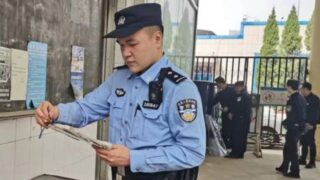Churches and temples were rigorously restricted to reopen after coronavirus measures were eased, and authorities used the situation to expand control over them.
by Jiang Tao
Many religious venues in mainland China found it hard to reopen after the coronavirus restrictions have been eased. And not for failing to meet epidemic prevention requirements but because the government found other pretexts to harass them.
The Luoyang city government in the central province of Henan allowed religious venues to reopen in June only after they passed an inspection by the Religious Affairs Bureau. The Dazhong Church, a Three-Self church in the city, was one of many that failed to qualify. The reason? The church had slogans with the word “God” posted on its outside wall.
A congregation member explained that officials ordered to remove two slogans: “God’s Grace is Great” and “I believe in God the almighty Father, the LORD who created the heavens and earth … I believe in eternal life.” “They said that all writings with the Chinese character for ‘God’ are banned outside the church,” the believer added.
To resume gatherings as soon as possible, the church removed the religious slogans and displayed numerous banners promoting the core socialist values, the Chinese culture of filial piety, and alike inside and outside the church, as was required by the Religious Affairs Bureau. “There is no space left for religious slogans,” the church’s deacon complained.
Regardless, the church remained closed. “We walked from afar to the church, intending to pray in it, but it was still closed, not allowed to reopen because the signs failed to meet the inspection’s standards,” said one of the congregation members who could not get inside the church on June 14. “If the church reopened without permission, the Religious Affairs Bureau would ban it from reopening forever. We could do nothing but comply with the requirements by the government.”
Other churches in the area were also banned from reopening on the pretexts that had nothing to do with epidemic prevention.
“Churches must submit sermons for the Religious Affairs Bureau’s inspection before they are allowed to reopen,” a Three-Self church deacon from Luoyang said. “A church in the city’s Yichuan county was barred from reopening because the sermon submitted by its preacher was deemed substandard: It mentioned the Bible, and there was nothing about the state’s love for the people during the pandemic.”
According to a deacon from another local Three-Self church, to pass the epidemic prevention inspection as early as possible, congregation members even cleaned the church’s windows several times and painted window railings, on top of implementing all required virus prevention measures. But Religious Affairs Bureau officials were not impressed. One of them remarked spitefully that the believers should not have bothered to clean the windows, because the church won’t be allowed to reopen.
“The government has the final say in deciding which church is allowed to reopen, regardless if they conform to the requirements,” a church member said.
On May 12, a Three-Self church in Diaoling village, administered by Henan’s Zhoukou city, was forced to demolish its cross as a precondition to reopening.
The government also implemented similar measures during inspections to prevent the spread of the virus earlier in the year. On April 27, crosses were removed from at least three Three-Self churches in the Hedong district of Linyi, a prefecture-level city in the eastern province of Shandong, after local authorities conducted a “health inspection for epidemic prevention.”


Buddhist, Taoist, and other religious venues were also harassed in the name of epidemic prevention.
“Officials said that the temple could reopen only after passing its inspection,” explained a director of the Buddhist Tongfo Temple in Tangyin county, administered by the prefecture-level city of Anyang in Henan.
After inspecting the temple on June 14, officials demanded to inscribe on traditional stone tablets the following slogans: “One can do well only when the country and nation do well” and “Peace, tolerance, unity, and progress.”
The next day, officials ordered to replace the temple’s Buddhist flag with the national flag. When this was done, they brought over a dozen posters promoting the “Four requirements” for religious venues to be displayed in the temple. The temple was still not allowed to open its doors to believers.
A Taoist temple and two folk religion temples in the county were similarly pressured. In hopes of passing the inspection, the folk religion Dadi Temple hired a worker on June 14 to paint over donor recognition steles by its entrance and write instead slogans promoting state policies and traditional Chinese culture.











